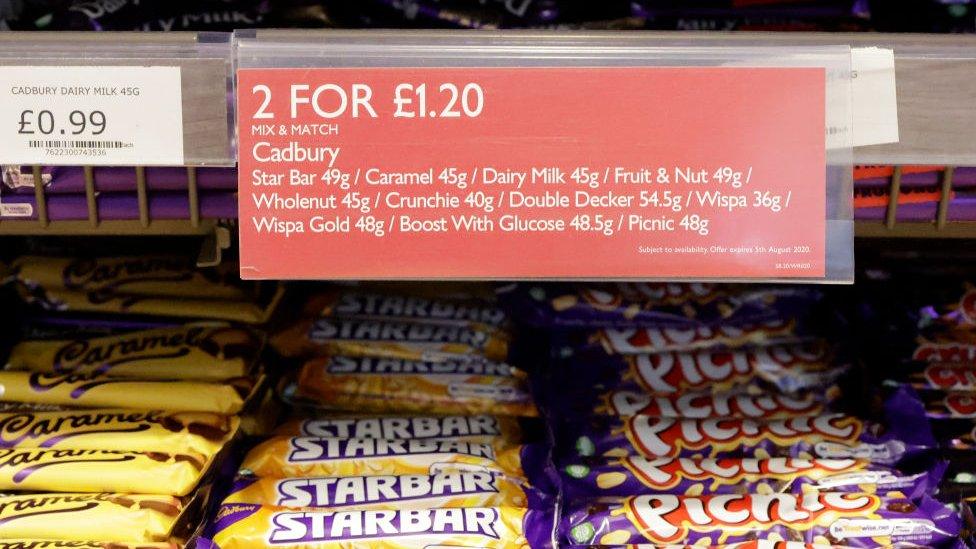Keep cake away from office, suggests food watchdog head
- Published

If you work in an office, you know the drill. It's someone's birthday and the unwritten rules mean they or a generous boss supplies cake (or cakes) for all.
But is it time to kick the cupcakes, to get the gateaux away? A food adviser says workers should not bring in sweet treats - to avoid tempting colleagues.
Food Standards Agency chairwoman Prof Susan Jebb compared being around cake in the office to passive smoking.
She said: "If nobody brought cakes into the office, I would not eat cakes."
Interviewed by the Times newspaper,, external and speaking in a personal capacity, she said workers should stop testing the willpower of colleagues.
But speaking to the BBC, GP Dr Helen Wall said people had to take responsibility for their own health.
The family doctor who practises in Bolton said: "If someone's got a cake next to you, you don't have to eat it, do you?"
Prof Jebb, also a professor of diet and population at the University of Oxford, said eating cake was a choice but colleagues could help each other by providing "a supportive environment".
She argued that being around cake in the office was like passive smoking, which though not identical also inflicted harm on others.
'No longer special'
Lou Walker, who authored a report on office cake culture, external, told BBC 5 Live that it was becoming an everyday occurrence and was "no longer special".
"[It] comes from a place of generosity and kindness, wanting to share," she said. "There's something very important about sharing food with colleagues.
"But what is happening now is it's happening every single day and that means that it's no longer special."
She said her research showed people "aren't wanting it all the time, but people are worried about sticking their head above the parapet."
In many workplaces cake, biscuits and sweets - brought by colleagues returning from holiday or to celebrate last days and birthdays - can start a scramble as hungry and sweet-toothed colleagues try to get their hands on the treats.
It is a rare workplace that breaks the tradition and supplies a fruit platter. And who wants to be known as the one staff member who brings in healthy nuts rather than chocolates as they regale colleagues about their weekend in Switzerland?
Dr Wall said it was fine to have some pleasures in the workplace.
Speaking on BBC Breakfast, she said: "It does feel like we're trying to control everything. At the end of the day you've got to have a little bit of willpower."
For one worker, a love of sweet treats in the office did not go down well with his colleagues.
While temping in an office in south London, Mick used to bring in biscuits, doughnuts, and chocolate bar multipacks, which he would "munch on" all day as well offering them out.
But he claimed he was told by management his diet was "aggressive" to his female co-workers who were trying to be health conscious.
"The ladies would say 'no, they're watching their weight'," he said.
As to the government's official position, the prime minister's official spokesman said Rishi Sunak believed "personal choice should be baked into our approach".
He added: "We want to encourage healthy lifestyles and are taking action to tackle obesity, which has cost the NHS £6bn annually.
"However, the way to deal with this issue is not to stop people from occasionally bringing in treats for their co-workers."
Mr Sunak's spokesman added that the prime minister was "very partial to a piece of cake" and most enjoyed carrot and red velvet cake.
According to the NHS website, a majority of adults in England are overweight. Regularly consuming foods and drinks high in sugar increases your risk of obesity and tooth decay.
The Food Standards Agency is responsible for food safety and food hygiene in England, Wales and Northern Ireland.
Prof Jebb, who is on the Times Health Commission, a year-long inquiry by the paper into the future of health and social care in the UK, expressed frustration at ministers' decision to delay the introduction of a TV watershed for junk food advertising.
The Department of Health said the plans would be deferred for a year while officials assessed the impact on household finances as families struggled with the increasing cost of living.

Share your experiences. Email haveyoursay@bbc.co.uk, external.
Please include a contact number if you are willing to speak to a BBC journalist. You can also get in touch in the following ways:
WhatsApp: +44 7756 165803
Tweet: @BBC_HaveYourSay, external
Please read our terms & conditions and privacy policy
If you are reading this page and can't see the form you will need to visit the mobile version of the BBC website to submit your question or comment or you can email us at HaveYourSay@bbc.co.uk, external. Please include your name, age and location with any submission.

A THOROUGH EXAMINATION: Does birth order affect your personality?
'FAFF ABOUT': Why do we procrastinate and how does it affect us?

- Published14 May 2022

- Published24 June 2016

- Published21 May 2014
